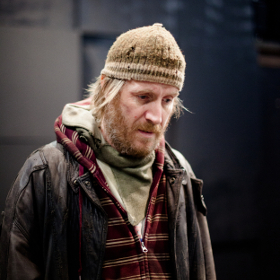Protest Song (NT Shed)

© Kwame Lestrade
The one-person play is a tricky medium. All too often it feels like an excuse for a writer or actor to flex their muscles, show off their skills. In cases like those you enjoy the performance or the writing, but are left with a sense of dissatisfaction: what was this play for?
Not Tim Price‘s new piece Protest Song. This is a story that could not be told in any other way, a work that demonstrates what the one-person play format is for. Because it’s a work whose protagonist is utterly alone.
Danny (Rhys Ifans) is a rough sleeper. (Having spent 70 tense, funny, bleak, eye-opening, heart-breaking minutes with this character, it feels wrong to reduce him to this heavily loaded label, but there you are – some sort of introduction is required.) Danny had been sleeping rough on the steps of St. Paul’s Cathedral for years when his peace was shattered by the arrival of Occupy. Protest Song is the story of Danny’s interactions with the motley crew of protesters who invaded his territory that winter and spring, and what happened after they left.
Danny is not an immediately likeable character. Ifans is nothing short of mesmerising from the first moment he lopes into the sparsely decorated shell of the National Theatre’s temporary venue, The Shed, but it’s uncomfortable sharing this space with him to begin with. Danny looks uncomfortable too, skirting around the edge of the stage rather than claiming it as his own. He directly engages audience members, sometimes obsequious, sometimes aggressive, an unpredictable presence in our midst. There is no fourth wall for us to hide behind here.
Polly Findlay‘s expert directorial touch, however, soon reveals this spiky individual’s garrulousness and charm and we are delighted when Danny co-opts us into his movement. He asks us to shout, we shout; he asks us to sing, we sing. And it’s not long before we’re repeating some pretty offensive stuff, about various politicians, agencies, systems. Some of us hesitate at first, but ultimately we do as he says, revelling in the feeling of anonymity that being part of a crowd confers, no matter how rude we're being about a certain blond-haired ex-Etonian.
The work of set designer Merle Hensel, lighting designer Lee Curran and sound designer Carolyn Downing sits quietly in the background for the majority of the play, letting Price’s writing and Ifans’s performance be the focus. In the final scene though, all three let loose and the results are deeply affecting.
This is a play about homelessness, the wealth divide, protest, apathy, alcoholism, family, community… the list of topics it touches upon goes on and on. Yet Protest Song is not an ‘issue’ play. There’s one moment towards the end where the tone flips briefly into sanctimoniousness, but it doesn’t last long, and it’s easily forgiven. Price has a real knack for humanising big subjects, for making audiences connect with them on a personal level, for picking out the stories that will enable us to empathise.
In one of the most devastating moments of the play, Danny asks several audience members, “Would you touch a roughsleeper?” After a long pause, each of them in turn tells him “no”. Danny doesn’t comment, and neither does Price – he doesn’t need to: our awkward silence says it all.










